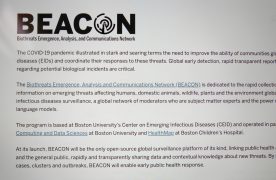With 145,000 people working in human services in Massachusetts, employment in the field has increased nearly 50 percent between 2003 and 2011, a recent report from the University of Massachusetts Donahue Institute revealed.
The Providers’ Council, a statewide association of heath and human service agencies, commissioned The Beyond Social Value report, released Wednesday. The report highlights a growing need for government financial assistance with the growing human service sector, which creates jobs for substance abuse problems, child welfare, the elderly and other healthcare issues, said Providers’ Council President and CEO Michael Weekes.
“We are fortunate to have a well-developed sector that provides needs for the most vulnerable of the population,” he said. “The human service field continues to be a viable field in providing tremendous social value to the people of the Commonwealth of Massachusetts.”
The human services sector in Massachusetts has experienced job growth of 47.9 percent from 2003 to 2011. Twelve percent of the workers in these fields are paid salaries that place them below the poverty level, compared to the 8 percent of workers that get paid at this level in all fields in Massachusetts, Weekes said.
“[The workers] say things to us like, ‘I love my job, I love the people in the workforce, I love making a difference in our society, but I can’t afford to work in this job … they just can’t afford to do that and raise a family,” he said. “If we can’t get the living wages to where we want them to be, we’re going to continue to see this growing need, and we won’t have the workers needed to address that.”
Dr. Michael Goodman, a Boston University alumnus who coauthored the report, said most people understand the social contributions that human services make to Massachusetts, but the economic contribution made by the sector is not understood.
“A lot of this work is supported by government financing and those resources have been in relatively short supply in recent years,” he said. “Part of the challenge that these providers face is how do you staff up and support these employees, and meet the needs of those who are in need of assistance and service in a very austere financial environment?”
Goodman said he is concerned that the growing industry and financial pressure will take a toll on the employees, making it difficult for them to continue working in the human services sector.
“Even though many of these employees are very personally dedicated, it becomes hard to justify continuing to work at a discount when it’s possible to continue to have the same value in a different location for a significantly higher wage,” he said.
Several residents said the report highlights an important issue in the human service sector, and raising government funding would be a valuable improvement to the salaries of human service workers.
Amy Schores, 32, of the South End, said the human service field should receive whatever support it requires to keep itself strong, whether that is increased funding or improved resources.
“The human services field is obviously really important to our society,” she said. “If it’s in need of aid from the government, they should give the field whatever it needs to sustain itself.”
Kyle Ferraro, 26, of Roxbury, said the employees who work in the human services deserve a salary that recognizes their tireless effort and hard work.
“I have a lot of respect for the [human service] workers doing these jobs,” he said. “I have a brother in the field, and he tells me stories about what he does. I’ll just say these people deserve higher wages more than anybody.”
Susan Morrissey, 45, of Back Bay, said funding the human services sector to raise the salaries of workers should be a priority for the government.
“The way it sounds, human services have needed the aid for a while,” she said. “I haven’t heard much about it until now. Something has to be done. If the government needs to give more money, they should do it.”
This is an account occasionally used by the Daily Free Press editors to post archived posts from previous iterations of the site or otherwise for special circumstance publications. See authorship info on the byline at the top of the page.












